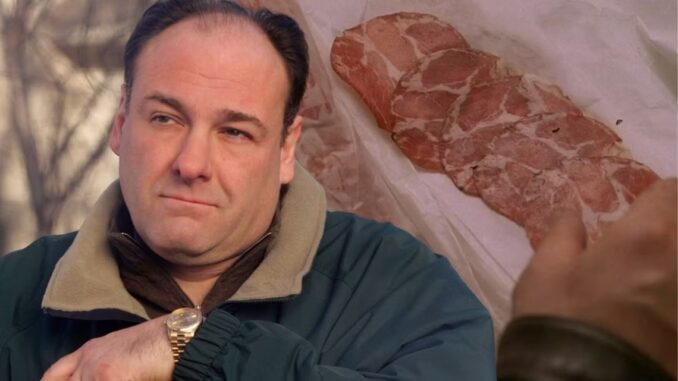
HBO’s hit crime-drama The Sopranos includes plenty of iconic quotes and scenes that have maintained the show’s popularity and influence for over two decades since its debut. However, one of its most recognizable details is a running gag featuring series lead Tony Soprano (James Gandolfini) repeatedly turning to his favorite meat snack called “gabagool.” If Tony was in the kitchen, fans could usually count on him going to the fridge to grab some, making the habit a memorable aspect of the famous character.
Despite gabagool’s popularity and the comedic value it adds to many scenes, audiences without an Italian-American or East Coast background may not know what exactly it is. Additionally, many viewers simply found it fun to say and then ran with it without coming to realize its underlying significance in Tony’s life — as a child and the gangster he became. Here’s an in-depth analysis of gabagool, its relatives in the meat industry, and how the recurring motif represents Tony’s existential dread that comes from balancing family with the glamorized violence of his work.
What Is Gabagool?
In short, gabagool is a type of salami. For anyone uninformed about the meat industry, a lot of pork-based products are distinct, not in their content but when it comes to how they are prepped and cut. More well-known types include bacon, prosciutto, and capicola; gabagool is a lesser known member of the same pork family.
Although the different kinds of salami are generally cut from the same part of the pig, the meat’s subsets differ in how they’re made: dried, cured, or with a certain slice technique. When it comes to Tony’s gabagool, butchers cut from a muscle starting at the neck and going down to the ribs. Then, the pork is dry-cured, meaning the moisture is removed through a combination of either salt curing, air drying, or even smoking. The process is similar to its thinner cousins, prosciutto and soppressata, but gabagool isn’t brined and looks more like normal salami. Gabagool also distinguishes itself by its flavor. The meat is typically fattier than other pork products, so it has a richer taste as well as a melt-in-your-mouth texture.
Additionally, even the most dedicated meat lovers may not know what gabagool is, because the term itself is slang. The actual name for it is “capocollo,” but it also goes by “coppa”. Along the East Coast, Italian-Americans often use shortened or varied names for their food. Mozzarella can be referred to as “mozzarel,” ricotta as “rigot,” and prosciutto is called “prosciut.” As for Tony’s favorite snack, it’s derived from capocollo, which later became “capacol” and then, finally, “gabagol.” His extended pronunciation of the final term as gabagool is the mob boss’s signature version.
Tony’s Panic Attacks Are Connected to Meat
Any fan of crime-family dramas is well aware of the pressure put on a mob boss’s son. Being an heir to illegal businesses and their consequential violence, especially exposure to it during one’s formative years, is a difficult legacy to carry — one that can change someone forever (usually for the worse).
One of the best episodes to delve into this inner conflict in The Sopranos is Season 3’s “Fortunate Son.” Christopher becomes a made man (a mafia career honor), and Jackie Jr. is on a similar path but without the necessary guidance since his father is gone. While the former is celebrating his new title and the latter struggles to make his way, both feel the heavy burden of a life dependent on crime. Despite being in the business for as long as he has, Tony also acknowledges that weight from his own upbringing.
As the episode wraps up, Tony describes a repressed childhood memory to Dr. Melfi (Lorraine Bracco) that came to him while grabbing some sliced meat from the fridge. Around 11 years old, Tony was in the car with his father when he stopped at Satriale’s. He was told to wait there while his father went inside, but adolescent curiosity motivated him to follow. After sneaking in, the boy sees his father and Uncle Junior beating up Mr. Satriale over a gambling debt. During the altercation, Uncle Junior holds down Mr. Satriale while his father grabs a meat cleaver and chops off the man’s pinkie. Needless to say, young Tony was traumatized.
Later that evening at dinner, while watching his mother then cooking up the meat his father brought home, an overwhelmed Tony experiences his first panic attack. Such a revelation explains the origin of Tony’s intense anxiety — for the audience and for himself. It also connects all of his other panic attacks that occurred after dealing with meat (most of them happening in his own kitchen while holding some gabagool).
The Meat of Being a Gangster
Despite Dr. Melfi noting what a breakthrough Tony made at the end of “Fortunate Son,” his habits don’t change. Throughout the series, the juxtaposition of a gangster like Tony in therapy gives viewers the hope that he can improve from it, that maybe even those making a living through crime still have a chance for redemption.
Ultimately, Tony never actually does the hard work of taking what he learned with Dr. Melfi about meat symbolizing his family’s traumatizing line of work, and course correcting. If he wanted the panic attacks to stop and to truly better himself for his children, he would have recognized the real problem: the crime and violence he perpetuates. However, the appeal of being a gangster, of his comfort-snack gabagool, was too much for him to give up. Whether under the threat of panic attacks or the consequences of his illegal activities, Tony accepted both as caveats of the life he wanted to live, of the person he wanted to be. Thus, gabagool wasn’t just Tony’s favorite food in The Sopranos, but embodied his efforts to cope with his traumas by consuming them just as they consumed him.